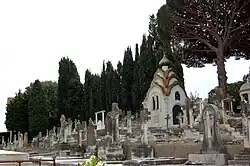Passy Cemetery
Passy Cemetery (French: Cimetière de Passy) is a small cemetery in Passy, in the 16th arrondissement of Paris, France.
| Passy Cemetery | |
|---|---|
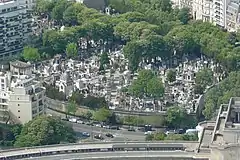 Aerial view of Passy Cemetery | |
| Details | |
| Established | 1820 |
| Location | Passy, Paris |
| Country | France |
| Coordinates | 48°51′45″N 2°17′07″E |
| Type | Public |
| Owned by | Mairie de Paris |
| Size | 1.75 hectares (4.3 acres) |
| No. of graves | 2600 |
| Website | Passy cemetery on the Mairie de Paris |
| Find a Grave | Passy Cemetery |
History
The current cemetery replaced the old cemetery (l'ancien cimetière communal de Passy, located on Rue Lekain), which was closed in 1802.
In the early 19th century, on the orders of Napoleon I, Emperor of the French, all the cemeteries in Paris were replaced by several large new ones outside the precincts of the capital. Montmartre Cemetery was built in the north, Père Lachaise Cemetery in the east, and Montparnasse Cemetery in the south. Passy Cemetery was a later addition, but has its origins in the same edict.
The current entrance was built in 1934 (designed by René Berger). The retaining wall of the cemetery is adorned with a bas relief (by Louis Janthial) commemorating the soldiers who fell in World War I.
Notes
Opened in 1820 in the expensive residential and commercial districts of the Right Bank near the Champs-Élysées, by 1874 the small Passy Cemetery had become the aristocratic necropolis of Paris. It is the only cemetery in Paris to have a heated waiting-room.
Sheltered by a bower of chestnut trees, the cemetery is in the shadow of the Eiffel Tower.
The cemetery was once the home of a statue by Dunikowski titled The Soul Escaping the Body. It was on top of the ceremonial grave of Antoni Cierplikowski. The statue was known by many but was removed when the grave was cleared in 2004.[1]
It is known as a small but well visited cemetery (Petit mais bien fréquenté).
Notable interments
Among its more famous residents are:
- Bảo Đại (1913–1997), the last Emperor of Vietnam
- Natalie Clifford Barney (1876–1972), Notable author, salonist and lesbian socialite of the Belle Époque
- Jean-Louis Barrault (1910–1994), actor and director; buried with his wife, the actress Madeleine Renaud
- Louis-Ernest Barrias (1841–1905), sculptor
- Jeanne Julia Bartet (1854–1941), actress
- Marie Bashkirtseff (1858–1884), Ukrainian artist famous for her published journal; her tomb is a recreation of her studio and has been declared a historical monument by the government of France
- Maurice Bellonte (1896–1983), pioneering aviator, as is his flight companion Dieudonné Costes
- James Gordon Bennett Jr. (1848–1918), American newspaper publisher, sportsman
- Tristan Bernard (1866–1947), playwright and novelist
- Henri Bernstein (1876–1953), actor
- Princess Brasova (Natalia Sheremetyev-Romanov) (1880–1952), wife of Grand Duke Mikhail Romanov
- George, Count Brasov (1910–1931), son of Grand Duke Mikhail Romanov and Princess Brasova (Natalia Sheremetyev-Romanov)
- Emmanuel de Las Cases (1766–1842), historian
- Dieudonné Costes (1896–1973), pioneering aviator, as is his flight companion Maurice Bellonte
- Emmanuelle de Dampierre (1913–2012), first wife of Infante Jaime, Duke of Segovia
- Marcel Dassault (1892–1986), engineer, founder of Dassault Aviation
- Claude Debussy (1862–1918), composer
- Maxime Dethomas (1867–1929), artist
- Ghislaine Dommanget (1900–1991), Princess of Monaco
- Michel Droit (1923–2000), novelist, member of the Académie française
- Henry Farman (1874–1958), champion cyclist and aviator
- Edgar Faure (1908–1988), statesman and World War II resistance fighter
- Gabriel Fauré (1845–1924), composer
- Fernandel (Fernand Joseph Désiré Contandin) (1903–1971), comedy actor
- Maurice Gamelin (1872–1958), supreme commander of French armed forces 1939–1940
- Maurice Genevoix (1890–1980), novelist; his remains were transferred to the Panthéon in 2020
- Rosemonde Gérard (1871–1953), poet and playwright
- Virgil Gheorghiu, (1916–1992), novelist
- Farideh Ghotbi (also known as Farideh Diba) (1921–2000), the mother of the former Shahbanu of Iran, Farah Diba[2][3]
- Jean Giraudoux (1882–1944), playwright, soldier, and statesman
- Hubert de Givenchy (1927–2018), fashion designer
- Anna Gould (1878–1961), socialite, daughter of financier Jay Gould
- Arlette Gueudet (1919–2012), widow of industrialist Robert Gueudet
- Jacques Guerlain (1874–1963), perfume creator from the House "Guerlain" in Paris
- Antonio Guzmán Blanco (1829–1899), Venezuelan politician and president
- Gabriel Hanotaux (1853–1944), statesman and historian
- Henriette Henriot (1857–1944), actress and artist's model
- Paul Hervieu (1857–1915), dramatist and novelist
- Gholam Hossein Jahanshahi (1920–2005), economist, Iranian statesman
- Jeanne Hugo (1869–1941), socialite and granddaughter of Victor Hugo
- Jacques Ibert (1890–1962), composer
- Paul Landowski (1875–1961), architect and sculptor
- Hector Lefuel (1810–1880), architect of the "Nouveau Louvre" expansion of the Louvre Palace[4]
- Joseph Florimond Loubat (1831–1927), bibliophile, antiquarian, sportsman, and philanthropist
- Albéric Magnard (1865–1914), composer
- Georges Mandel (1885–1944), statesman, French Resistance during World War II
- Édouard Manet (1832–1883), realist and impressionist painter
- André Messager (1853–1929), composer and conductor
- Alexandre Millerand (1859–1943), President of France
- Octave Mirbeau (1848–1917), anarchist, art critic, and novelist
- Berthe Morisot (1841–1895), impressionist painter
- Togrul Narimanbekov (1930–2013), Azerbaijani painter
- Joseph O'Kelly (1828–1885), Henri O'Kelly sr. (1859–1938), and Henri O'Kelly jr. (1881–1922), Franco-Irish composers and musicians
- Leila Pahlavi (1970–2001), Princess Leila of Iran, daughter of the last Shah of Iran and Farah Diba[2][3]
- Gabrielle Réjane (1856–1920), actress
- Madeleine Renaud (1900–1994), actress; buried with her husband, the actor and director Jean-Louis Barrault
- Marcel Renault (1872–1903), industrialist, racing driver, co-founder of Renault motor company
- Maurice Rostand (1891–1968), playwright
- Constantin Rozanoff (1905–1954), colonel, test pilot
- Haroun Tazieff (1914–1998), vulcanologist
- Renée Vivien (1877–1909), writer, poet
- Pearl White (1889–1938), American silent film star, famous for doing her own stunts in her serials The Perils of Pauline
- Jean-Pierre Wimille (1908–1949), Grand Prix race driver
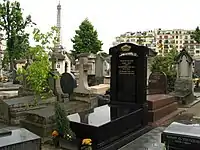 Grave of Bảo Đại, last Emperor of Vietnam
Grave of Bảo Đại, last Emperor of Vietnam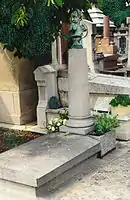 Grave of Édouard Manet
Grave of Édouard Manet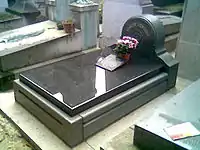 Grave of Claude Debussy
Grave of Claude Debussy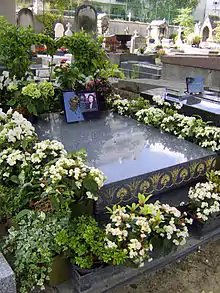 Grave of Leila Pahlavi
Grave of Leila Pahlavi Grave of Antonio Guzmán Blanco
Grave of Antonio Guzmán Blanco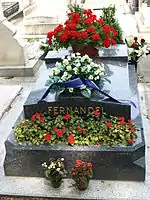 Grave monument of Fernandel
Grave monument of Fernandel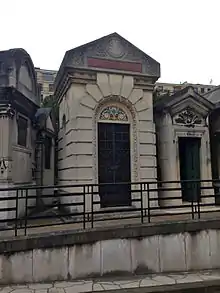 Mausoleum of the Guerlain clan
Mausoleum of the Guerlain clan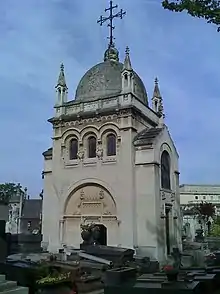 Tomb of Marie Bashkirtseff, a recreation of her studio
Tomb of Marie Bashkirtseff, a recreation of her studio
Location
The entrance of the cemetery is located at 2, Rue du Commandant Schlœsing. The street in which it is situated is named for a Free French pilot, Squadron Leader Jacques-Henri Schlœsing (1919–1944), who flew with the wartime RAF until killed in action, the day that Paris was liberated.
The cemetery is behind the Trocadéro.
References
- The Mystery of Antoine Cierplikowski
- "Shah's daughter 'could not stand' exile". BBC News. 12 June 2001. Retrieved 23 May 2022.
- "Leila Pahlavi; Deposed Shah's Daughter". Los Angeles Times. 12 June 2001. Retrieved 23 May 2022.
- Kirkland, Stephanie (22 December 2011). "Paris Places: Passy Cemetery. Retrieved 4 March 2014.
External links
- (in French) Passy Cemetery on the Mairie de Paris website (with plan)
- (in French) Passy Cemetery on the Cimetiéres de France et d'Ailleurs website
- Information and help in touring Passy cemetery.
- Photographs of Passy cemetery Documenting funerary statuary in Paris cemeteries; on pariscemeteries.com
